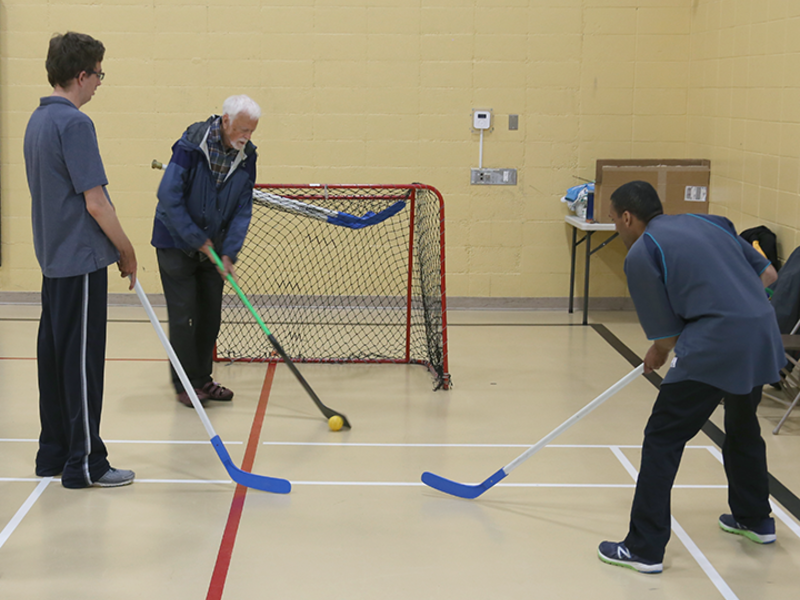Local community group encourages activity, socialization, and challenging expectations

Play Beyond Expectations is a community activity group that focuses on uncovering the latent strengths of people with disabilities while providing physical exercise and socialization. Participants are encouraged to try activities such as pickleball and hockey in an environment that adapts to their limitations and provides encouragement.
Founder Brian Gray is a development coach who came up with the idea of challenging the assumptions that can hold people with disabilities back, which often focus on the person’s lack of ability rather than their strengths.
“Play Beyond Expectations reflects the experience of the individuals that come, because every session, every client does things that either they didn’t expect, or the parents or support workers didn’t expect,” he says.
Gray says that the program is about uncovering a new realm of possibilities not only for the client, but also the caregivers. He encourages them to create activity plans that allow for personal growth, rather than stagnation. An activity plan outlines and structures the participant’s programing. They are often tied into personal case files so that there is a detailed history of their progress.
“One of the focuses in the program is to get the parents and the support workers to see the person differently. It’s designed to give that client the best chance to succeed, and everybody else the best chance to see it,” he says. “If the staff make assumptions about what the person can or cannot do, and set up their program accordingly, then the person is never given a chance to exceed anybody’s expectations.”
Gray says that recognizing progress and achievement is key. Every session, each Play Beyond Expectations client should leave feeling like their progress was affirmed.
“Sometimes the steps forward are really small,” he says. “But I think if the affirmation is there, and if it’s an enthusiastic affirmation, that really helps sustain the effort to keep on going and discovering what they can do.”
Trying new things can be difficult for the participants, but Gray says that the crucial thing is for participants to push forward and allow their brain and body to adapt and develop new skills.
“They come in and they’re afraid they’re going to fail, but first of all, the important thing is to try and make the effort, and then be patient and keep trying,” he says. “I have a phrase: give your brain a chance.”
Adapting to adult life can be difficult for some people with disabilities, because if they’re not skilled at advocating for themselves, they may not be able to access adequate support to help them reach their full potential. Gray says that his program focuses on finding people who have slipped through the cracks and giving them a chance to succeed.
“This program is looking at pulling them out of the crevasse and setting them up on the next level of being able to try and get a better quality of life,” he says. “The thing is, when you get that celebration and you get the endorphins going and everything, it just cycles, and there’s that old phrase, ‘nothing succeeds like success,’ and suddenly you’re more energized to try the next step, and we just keep building.”
Gray says that peer acceptance and the push to reach new heights can lead to unexpected success.
“You’re in a place where it’s okay to be you,” he says. “The program is totally focused on development. Simple things can lead to big things.”
The PBE program is currently accepting registration for Tuesdays from 3:30-5 and Fridays from 1:30-3. Sessions are held in the Esquimalt Recreation Centre gymnasium. There is a drop-in fee of $5.75 per client. Caregivers play for free.






